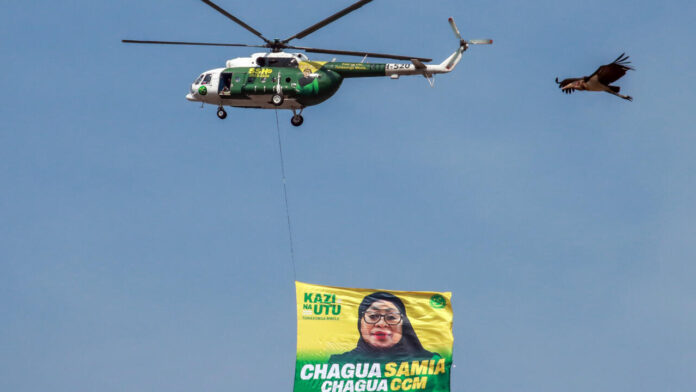Tanzania was plunged into a communications blackout on Thursday, a day after elections descended into violent chaos, with unconfirmed reports of dozens killed.
President Samia Suluhu Hassan had been seeking to tighten her grip on power in a virtually uncontested vote, with her main opponents either barred or behind bars. But the election spiraled into turmoil as protests erupted nationwide.
In Dar es Salaam, reporters saw a police station set ablaze, while polling centers were attacked and images of the president torn down in several areas. A diplomatic source told AFP there were “unconfirmed reports of 30 or more people killed.”
An internet blackout, along with restrictions on international calls, has made independent verification nearly impossible. The government has not issued any statement, and heavily controlled local media have carried no new reports since early Wednesday.
Schools and colleges were closed on Thursday, and civil servants were told to work from home. An AFP correspondent reported hearing gunfire across Dar es Salaam throughout the day.
Rights groups had warned ahead of the polls of a “wave of terror” marked by abductions and intimidation. Several high-profile disappearances were reported in the final days before the vote.
“It’s unprecedented… Where we go from here is unclear,” a diplomat said, describing Hassan’s status as “uncertain.”
On the semi-autonomous island of Zanzibar, the situation remained calm, though ferries to the mainland were suspended. At the airport, stranded tourists slept on the floor amid their luggage as card transactions failed and cash ran low.
“I have never experienced anything like this,” a France-bound passenger said.
Much of the anger online has focused on the president’s son, Abdul Hassan, who was reportedly heading an “informal task force” of police and intelligence officers to oversee election security. The unit has been accused of orchestrating abductions of critics, including a popular social media influencer known as Niffer, who vanished after posting satirical videos urging people to vote.
Hassan, Tanzania’s first female president, came to power in 2021 following the sudden death of her predecessor, John Magufuli. Initially praised for easing restrictions on the opposition and media, she has since faced mounting criticism for presiding over a new wave of repression.
Amnesty International warned Thursday that “the risk of further escalation is high,” urging authorities to show restraint.
Hassan has also faced resistance within her own ranks both from army factions and loyalists of Magufuli’s hardline government as she sought to consolidate authority.
Her chief rival, Tundu Lissu, is currently on trial for treason and faces the death penalty, while his party, Chadema, has been banned from contesting. The only other viable challenger, ACT-Wazalendo’s Luhaga Mpina, was disqualified on technical grounds.
With communication cut, foreign media barred, and the government silent, the full extent of the unrest remains unclear. But the violence marks one of the most serious political crises Tanzania has faced in years and leaves the future of Hassan’s leadership in question.

